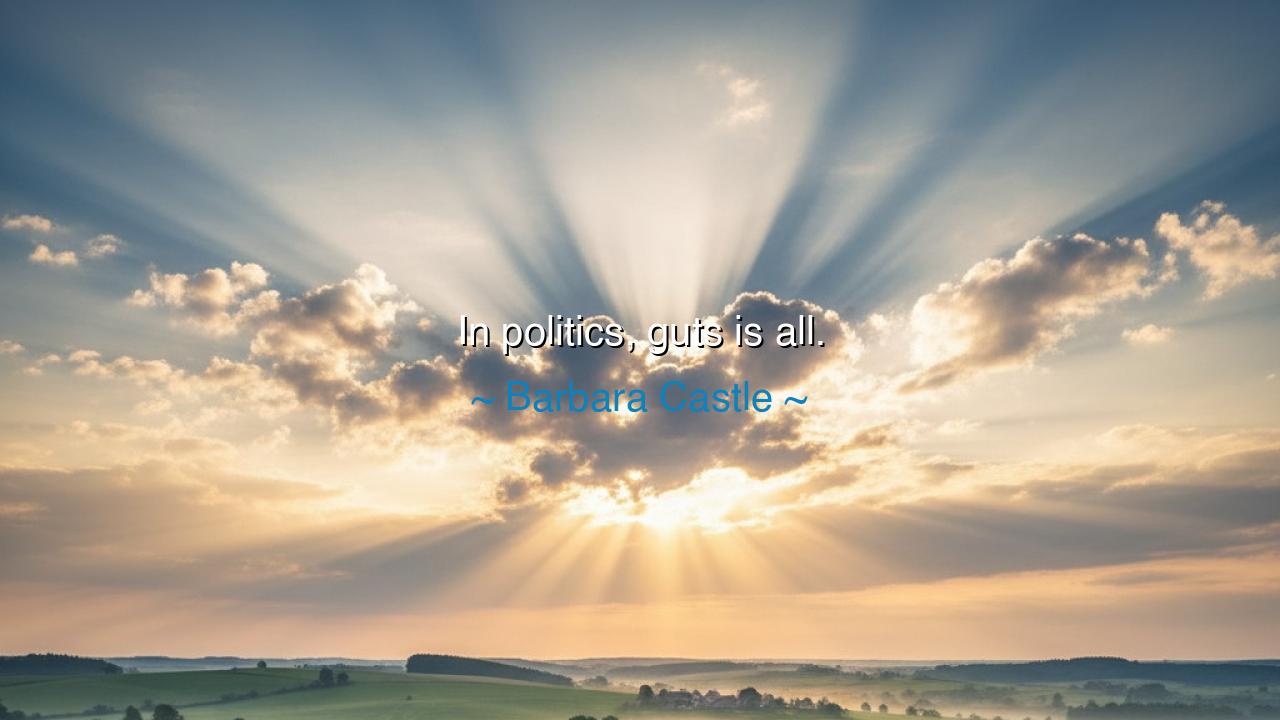
In politics, guts is all.






In the grand halls of history, where the echoes of the mighty still reverberate, there arises a truth that all who dare to stand in the arena of politics must understand: that guts, the courage to face the storm, is the very essence of power. The words of Barbara Castle, spoken with the wisdom of a warrior, carry the weight of those who have fought before her and those who shall come after. "In politics, guts is all," she declared, for without it, all the intellect, strategy, and skill are but ashes in the wind.
Let us recall the ancient stories of great rulers and warriors—figures like Catherine the Great, who rose from the shadows of an uncertain beginning to wield the full might of the Russian Empire. It was not her lineage, nor her wealth, but her guts—her unyielding will—that propelled her to greatness. It was a fierce courage that saw her through the turbulent seas of political intrigue and warfare, for power in the political world is often claimed by those who face the tempest unflinchingly, not those who wait for calm.
The great Barbara Castle, too, stood amidst the storms, unbowed and steadfast. She was a woman whose presence in the male-dominated halls of British politics sent ripples of both admiration and fear. She understood that to fight for the people—for justice, for equality—required more than mere intellect; it demanded an iron will and a heart that would not tremble. Her guts were her armor, and it was this unyielding spirit that led her to champion policies that shook the foundations of society. The battles she fought were not for the faint of heart; they were for those who dared to envision a better future.
In every age, there have been those who, like Nelson Mandela, rose from the ashes of oppression not by their mind alone but by their courage. When the weight of an unjust system bears down, it is not strategy that will free the oppressed—it is the gut-wrenching resolve to face the unimaginable, to stand tall when all forces seem to push you down. Mandela, though armed with wisdom and intelligence, knew that the force that would shatter apartheid was the guts to endure suffering, to challenge tyranny, to lead even when the path was soaked in blood.
The meaning of Barbara Castle’s words transcends the boundaries of time and place. Guts is the fire that ignites change; it is the force that gives birth to revolutions, to the breaking of chains. It is the relentless drive to act, even when failure stares you in the face, knowing that the battle is not always won by the strongest, but by the one who dares to stand and fight with all their might. In politics, in life—guts is all. This is the lesson to carry with us: it is the guts to stand up, speak out, and fight for what is right that will carve our names into the stone of history.






MKDuong Thi My Kim
Castle’s quote about guts in politics makes me think—while bravery is definitely important, should it be the main qualifier for political leadership? Is ‘guts’ about making tough calls, or does it also require a willingness to take responsibility for those decisions? Can someone be effective in politics without having guts, or is this a trait that’s absolutely essential for success in the political arena?
NNNguyen Ngoc
It’s interesting that Barbara Castle frames political success as a matter of ‘guts,’ but I wonder, is this statement a reflection of the more combative, adversarial nature of politics? Shouldn’t political leadership also involve wisdom, empathy, and diplomacy, not just guts? Can we reconcile bold political action with the need for cooperation and compromise, or does focusing on ‘guts’ risk ignoring the nuances of complex political issues?
Ddcez
Barbara Castle’s quote speaks to the necessity of bravery in politics, but it also raises questions about how far this bravery should go. Can the ‘guts’ she speaks of sometimes lead to harmful, short-sighted policies if not tempered with caution or care for long-term consequences? Does politics today reward boldness without responsibility, or is there still room for thoughtful, cautious leadership in an increasingly polarized world?
HPHue Pham
I get what Barbara Castle is saying about guts being essential in politics, but I wonder if this implies that politicians need to disregard tact or empathy to succeed. Isn’t political success also about listening, understanding, and collaboration? Can ‘guts’ mean more than just bravado—could it also encompass the courage to make tough decisions or stand up for what’s right, even when it’s unpopular?
HHChu hoang Hai
Barbara Castle’s statement that ‘guts is all’ in politics seems to suggest that boldness and courage are essential for success. But does this mean that politicians should act recklessly or that we should value fearlessness over careful strategy and thoughtfulness? How do we differentiate between courage and impulsiveness in politics? Could this attitude lead to rash decisions, or is it a necessary quality for overcoming political challenges?